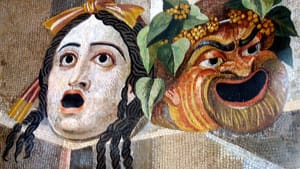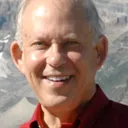Stay in the Loop
BSR publishes on a weekly schedule, with an email newsletter every Wednesday and Thursday morning. There’s no paywall, and subscribing is always free.
Theater as interpersonal encounter and spontaneous experience
'Impromptu Man: J.L. Moreno and the Origins of Psychodrama'

Jacob L. Moreno (1889-1974) was an iconic psychiatrist known for psychodrama and sociometry, the study of interpersonal connections and social networks. As this book amply illustrates, he was also a wide-ranging thinker, innovator, and gadfly who influenced not only psychiatry, but also the dynamics of large institutions, the human potential movement, sociology, theater, and the media.
Jonathan Moreno, himself a noted author and professor of medical ethics and health policy and of the history and sociology of science at the University of Pennsylvania, presents a portrait of his father and his influence, based upon both personal experience and extensive scholarly research. The reader emerges with a sense of a man who had a profound impact on 20th-century life: the theater; reforms of prisons, mental institutions, and schools; World War II assessment of soldiers and intelligence operatives; the encounter group movement; organizational development; and, posthumously, social media. But his love of theater began early and infused all of his work.
Improvising in Vienna and New York
The story begins in the early 1900s, when the young Jacob Moreno moved from his home city of Bucharest to Vienna and became involved in its intellectual life and theater scene at the same time as he pursued medical studies. He had a brief encounter with Sigmund Freud, boldly telling the master that he was too focused on the past and not enough on creativity and spontaneity. Moreno edited the prominent literary arts journal Der Daimon and hung with some of the best minds and creative people of the time, including Franz Werfel, Max Brod, Alfred Adler, and Max Reinhardt.
Moreno gravitated to the theatrical world, where he created mostly improvisational performances. A young Peter Lorre (then László Loewenstein) was one of his protégés. Moreno was a prime mover in the theater scene of 1910-1925 Vienna, and, even after he started his psychiatry practice and moved to New York, the theater occupied a central place for him. In the 1930s, he became involved in the Group Theater, and in the studio annex of Carnegie Hall, he founded the Impromptu Theater. His theatrical work and demonstrations of psychodrama influenced the subsequent method acting of Stella Adler and Harold Clurman.
He continued to find new ways to combine theater, therapy, and social interaction, laying some of the groundwork for Esalen and the encounter group movement of the 1960s. His therapy approach, psychodrama, consisted essentially of role improvisation based on issues and conflicts expressed by patients. Instead of a couch, he used dramaturgy: a stage, role players, and an audience to put the patient’s concerns into heightened awareness and action. Woody Allen, Dustin Hoffman, and Alan Alda were among many theater people who attended Moreno’s psychodrama demonstrations.
Encounter
At the heart of Moreno’s ideas about theater, therapy, and life itself was the encounter, an open and honest engagement with others, “a meeting of two: eye to eye, face to face,” that in some ways anticipated Buber’s “I-Thou” meeting and existentialist authenticity. Theater in Vienna was an integral part of daily life and conversation. Moreno felt that theater should transform both the actors and the audience, addressing their deepest problems and concerns in the here and now. He sometimes took this to extremes, as when he posed on stage as the endangered Austro-Hungarian monarch and asked the audience to decide his fate. For Moreno, theater involved a direct experience of action with life-changing possibilities.
An important dimension of encounter was to put oneself directly in place of the other and know what it was to be him or her. This involved the technique of role reversal, which to this day is used extensively in theater, therapy, and personal growth groups. When you reverse roles, you enrich experience with new perspectives. This creates what Moreno called “surplus reality,” the manifestation of possibilities that would never occur if you stayed wrapped up in the cocoon of self. For Moreno, theater is not the acting out of a playwright’s scripted dialogue. Rather, it is the spontaneous creation of a new reality in which we encounter our true selves in relation to others. And we can take what we experience in the theater to create new realities in our lives.
However, there are hazards. In Paul Mazursky’s 1969 film Bob & Carol & Ted & Alice, the two couples try to create a new reality out of their encounter group experience by swapping partners, with very mixed results. In the more recent Academy Award-winning film Birdman, the surplus reality gets out of hand. The main character, who happens to be an actor/director, becomes absorbed in his roles and can’t find his real self anymore. Theater can be a risky business.
Spontaneity
Moreno came from a Jewish culture that had a mystical and messianic tradition. He believed that each person is a spontaneous creator, a living God, a creative force of cosmic proportions. He literally claimed he was God (!), which made people think he was mad, but his omnipotence was tempered by his contention that everybody is God, creating their lives as God created the world, and by his belief that being God means not only ultimate power but also ultimate responsibility, tikkun olam. Translated into theater, each actor, like God, spontaneously generates and is responsible for the part he or she plays.
For Moreno, this was much more than method acting, in which the actor draws on his or her own emotions. Theater is to be completely spontaneous. Bring actors and audience into a room and see what happens. Improvisational theater has its origins in this idea but usually uses prepared premises and assigned roles. Moreno, by contrast, used totally unprogrammed acting situations, often to the dismay of the critics. Again, his ideas involved risks, which is one reason why improvisational theater, such as that of Second City, involves considerable preparation.
The essence of Moreno’s contribution to dramaturgy is that theater is spontaneous, co-creative, authentic, and transformative action. It’s the good doctor’s prescription for our ills, but not an easy one to follow. Read the label carefully before using.
What, When, Where
Jonathan D. Moreno. Impromptu Man: J.L. Moreno and the Origins of Psychodrama, Encounter Culture, and the Social Network. (New York: Bellevue Literary Press, 2014). Available on Amazon.
Sign up for our newsletter
All of the week's new articles, all in one place. Sign up for the free weekly BSR newsletters, and don't miss a conversation.

 Victor L. Schermer
Victor L. Schermer